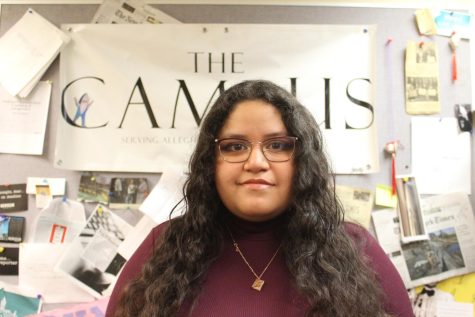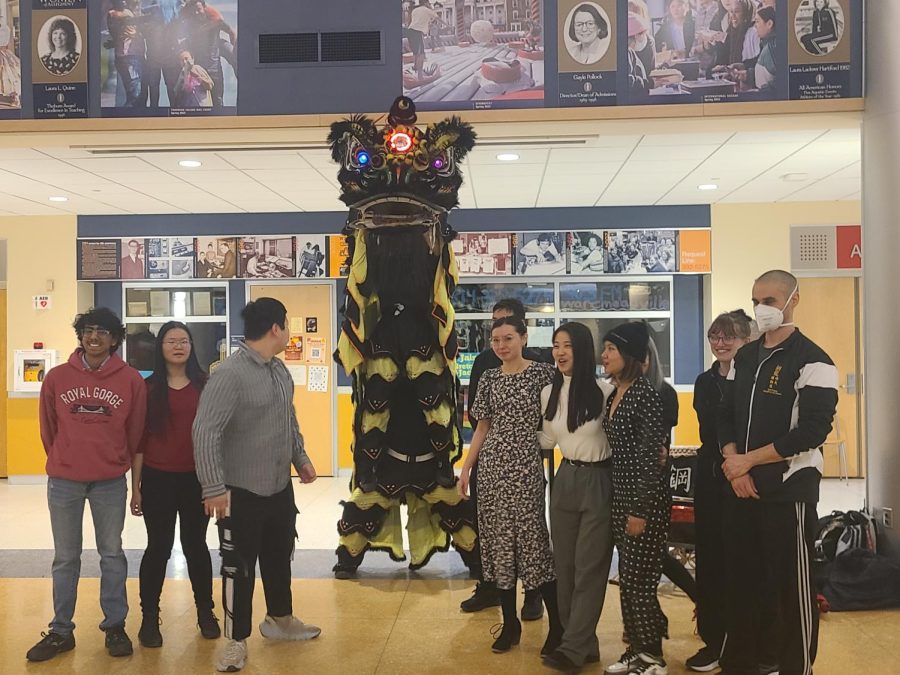A5 celebrates Lunar New Year with food, Lion Dance performance
Many cultures in Asia celebrate the Lunar New Year, a festival of celebrating the beginning of the new year. The Association for Asian and Asian American Awareness welcomed the Lunar New Year on Saturday Feb. 4, in the Henderson Campus Center lobby from 7-9 p.m.
A5 Co-President Owen Wang, ’23, said the celebration was planned to include food from the New Imperial Buffet, a Lion Dance performance by the Steel Dragon dance team and paper cutting.
“For the food, we have a broad range of Asian food instead of anything specific,” Wang said. “Since we are celebrating the Lunar New Year, it doesn’t just include China because it is also celebrated in Korea, Vietnam and Japan.”
The Lunar New Year celebration is typically two weeks and is celebrated based on the lunar calendar, according to National Geographic. The celebration is meant to symbolize the ridding of bad luck the previous year and the welcoming of good luck in the coming year.
Co-President Aria Zong, ’25, explained that while A5 was able to include all the important aspects of the celebration, there were some difficulties with budgeting for the event because of new financial policies.
“Most of the challenges in planning the event were trying to work with the student government in terms of our finance problems,” Zong said. “Like trying to submit the forms in time because they are enforcing the new two weeks rule for finance requests.”
A5’s previous food budget of $850 was reduced to $350 this semester, so less was spent on food for the celebration, according to Wang. However, the club chose not to apply for more financial support. Attendees at the event were served by A5 members who announced that they were welcome to have seconds.
Steel Dragon Instructor Chris Young explained that the Lion Dance — which was the main event at the celebration — is typically performed at cultural celebrations such as the Lunar New Year to welcome the new year.
“This year is the Year of the Rabbit for the Chinese, but for the Vietnamese it is the Year of the Cat,” Young said. “In this set up we have carrots representing rabbits, (and) little gold ingots that represent prosperity. Tangerines also represent prosperity, pineapple represents abundance and candy represents sweetness.”
During the Lion Dance, the performers threw the representative items, such as lettuce, at the audience. The lettuce throwing represents the lion spreading wealth, prosperity and good luck, according to Hawaii Magazine.
Ana Bonilla, ’25, was invited to attend the event by friends. She explained that, as an international student from Guatemala, she has become more familiar with other cultures through college.
“I liked the event because you can learn things about a country that maybe you didn’t know much about,” Bonilla said. “I enjoy learning about other cultures.”
While having cultural celebrations on campus can help students build community on campus, it may cause some homesickness for international students who have the same celebrations at home, according to Wang.
“As a Chinese student, when we have the celebration we probably all say, ‘Oh, that is very different from what I had back in China,’” Wang said, “Homesickness for the most part is under control because at least they will feel that somebody will celebrate your cultural traditions and even though you are probably homesick you won’t be forgotten.”
Wang said that A5 is planning to have more board meetings to introduce more events such as game nights.
“We have Asian board games and Asian movies for movie nights,” Wang said. “It is also a possibility that we can get some mini vans from school to go to the closest Chinatown which is in Cleveland.”
Zong said A5’s goal was to bring more awareness of Asian cultures on campus through the Lunar New Year celebration.
“We wanted to celebrate this event because this is one of the biggest events in Asia,” Zong said. “This is a good way to spread awareness on campus because Allegheny is a predominantly white institution and the minorities versus the white population on campus has a really big disparity especially with the Asian American Pacific Islander community here.”
Events by A5 will continue to try to give international and Asian American students a chance to feel like a part of their community is available on campus, according to Zong.
“I feel like these events help keep the API community here and give them a way to feel like their cultures are celebrated in the U.S. and feel at home,” Zong said.

Evelyn Zavala is a senior from San Francisco. She is majoring in Business and minoring in Journalism in the Public Interest. This is her fourth year on...







